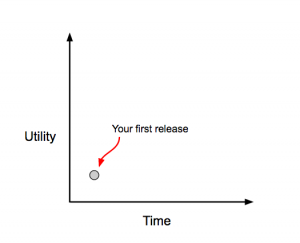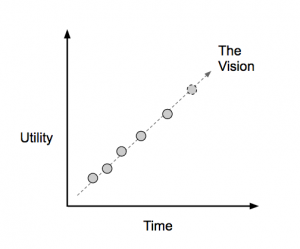I see a lot of founders and startups struggling with explaining what they are trying to accomplish. Many are just focused on how they are going to do the next thing. The next release, the next pitch, the next campaign.
Releasing a product is not an accomplishment in and of itself. Launching isn’t either. Getting a feedback and signs of traction never quite feels like enough.
Why are you doing all this?
Mark Suster wrote an important blog post in 2010: Invest in Lines, Not Dots.
The tl;dr: Relationships are important.
It’s easy to think that when you meet someone once, you’ve MET them. It just isn’t true. A relationship is that line that is formed across a series of encounters.
Products are no different and the sins that we commit are the same as those Mark describes.
Mark says:
“[ . . ] I tell entrepreneurs the following: Meet your potential investors early. Tell them you’re not raising money yet but that you will be in the next 6 months or so.”
 In a world of fast iteration and Running Lean, it’s easy to think of products as the entire picture. It’s one big giant dot that we hope brings us success and a mass of users.
In a world of fast iteration and Running Lean, it’s easy to think of products as the entire picture. It’s one big giant dot that we hope brings us success and a mass of users.
It’s never like that though.
Your Product is a relationship with your users. Like Mark (and the rest of us), Users invest in Lines, not Dots.
When you have that first meeting you need to not only make a good impression, but you have to tell everyone where you are going. We call it Vision.
Release Early, Then Release With Purpose
Fast product iteration is important: You listen to users, you monitor and assess metrics and you make changes that bring your product closer to perfection.
Perfection is not what you need: Purpose is. Why are you releasing and why should users and customers continue to invest in you and your product with their time, money and feedback?
In looking for perfection (product/market fit?) it’s easy to think it is something that *just happens* and then you are instantly successful. It’s never like that. It takes work and focus, and a vision for how the future is going to be different for your customers because of it.

Vision is what defines the future you see for you and your customers. It’s why they try things for the first time and it’s why they will stick around even when you don’t quite get things right.
It’s easy to miss and it’s easy to get bogged down in the day to day, but if you have it and if you can articulate a vision, then you have a better business plan than you could ever put in a doc or deck.
When you iterate on your product and deliver releases, it should be about taking the customer closer to your vision for your product and why it’s important.